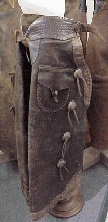Who was Lee Peterson?
 The vintage woodworking tools, farm and haying tools, logging tools
and blacksmith tools on display at the Coquille Valley Historical
Museum is the collection Leland "Lee" Peterson gathered over
a period of 30 years. Some of the pieces are over 200 years old. In
September, 1989 when Lee Peterson was nearly 90 years old he sold his
cattle ranch at Fat Elk, and his collection of tools, valued at
$15,000 went to the City of Coquille for half that price with Coquille
and the Port of Bandon splitting the cost. Former city manager Patti
Strain and Nancy Haugland, chairperson of the Downtown Development
Forum, inventoried and tagged the some 100 pieces with intentions of
displaying them in the old Coquille Railroad Depot, but that never
materialized. The depot was torn down and the tool collection was
stored in the basement of Coquille Community Building where they
remained for 16 years; until 2005 when the Coquille Historical Society
was organized and the City of Coquille loaned the collection to be
displayed in its museum.
The vintage woodworking tools, farm and haying tools, logging tools
and blacksmith tools on display at the Coquille Valley Historical
Museum is the collection Leland "Lee" Peterson gathered over
a period of 30 years. Some of the pieces are over 200 years old. In
September, 1989 when Lee Peterson was nearly 90 years old he sold his
cattle ranch at Fat Elk, and his collection of tools, valued at
$15,000 went to the City of Coquille for half that price with Coquille
and the Port of Bandon splitting the cost. Former city manager Patti
Strain and Nancy Haugland, chairperson of the Downtown Development
Forum, inventoried and tagged the some 100 pieces with intentions of
displaying them in the old Coquille Railroad Depot, but that never
materialized. The depot was torn down and the tool collection was
stored in the basement of Coquille Community Building where they
remained for 16 years; until 2005 when the Coquille Historical Society
was organized and the City of Coquille loaned the collection to be
displayed in its museum.
Lee Peterson was born on a homestead near Garibaldi, Oregon. At a young age he moved with his family to California where he lived for the next 20 years. Some of that time he worked as a cowboy on a large cattle ranch. He also enjoyed riding in rodeos and was said to be very proficient at it. It was during that time that an old master carpenter died and his tools were being scattered about. Lee was able to get two wooden planes and that was the start of his collection. In 1927 a friend invited him to share a trip to Oregon and he accepted. The same year he married his wife Helen.
The third day after arriving in the Coquille Valley he took a job building a large barn. After the barn was completed he received other carpentry jobs. In 1928 when the new Coquille Methodist Church replaced the original one he did all the interior finish work. He and Helen remained a member of that church the rest of their lives. For the next 10 years Lee worked as a foreman in the house building trade. Then the owner of the ranch where he worked in California purchased extensive fields south of Coquille that became known as the Russ Estates, and Lee accepted the position of Ranch Manager offered to him. People who only knew Lee the carpenter would comment “What does a carpenter like Lee know about ranching?” Then ten years later when he went back to carpentry people who knew him as a rancher commented “What does a rancher like Peterson know about carpentry?” I guess forget quickly.
When Lee married Helen Laird he also inherited many of her father’s old woodworking tools, then ever time he went on a trip he would come home with a few new pieces to add to his collection. Their son also added to the collection when he found a tool his father would like. One time it was a heavy boring machine shipped from Ohio. The freight bill was one you wouldn’t believe.
Wayne Nelson was raised next door to the Peterson Ranch on Fat Elk Creek where Lee raised registered polled Hereford cattle along with his carpentry work. Wayne was a member of Lee’s haying crew every summer growing up and remembering him as the perfect gentlemen, and his wife as the best cook on Fat Elk Creek. After the noon meal Lee always took a fifteen-minute nap before going back to work. Wayne also remembers Lee had an extra-wide-brimmed hat hanging on his back porch that Wayne would have loved to get his hands on, but never figured out how he was going to do it.
The things this writer remembers about Lee Peterson was that he built my kitchen cabinets when three other professional cabinet makers refused to build them the way I wanted, that is, multiple flush doors and drawer fronts made from a single piece of birch plywood so the grain patterns would be intact when the doors and drawers were closed. Lee didn’t hesitate in taking the job, but he did mention if he ruined one drawer front on a stack of five drawer fronts, one above the other, he would ruin them all. “That’s right” I said, “so you had better not ruin a drawer front.” He didn’t, and with perfectly mitered corners I had cabinets that rivaled the finest furniture. Lee Peterson was truly a master finish carpenter.
This information comes from an interview with Lee Peterson in September, 1989 prepared by Marilee Miller, special writer for the Coquille Valley Sentinel, and Brad Ross, editor of the Coquille Valley Sentinel. Also a personal interview with Wayne Nelson, owner and operator of the Roxy Barbershop in Coquille.
Copywrite 2006 by Boyd Stone